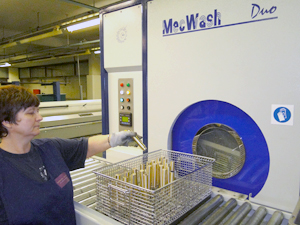A 40% reduction in the time required for component cleaning has been realised at a leading brassware manufacturer in Birmingham as the result of a MecWash aqueous cleaning installation. Samuel Heath, who produce up to 8,000 different types of brass components – primarily for use as bathroom, door and hardware fittings – is now reporting a reduction from its previous five days per week solvent-based cleaning operation, to just three.
With a history dating back to 1823, Samuel Heath has a long-standing reputation for quality products. Where once bedsteads, candelabras and vehicle headlights were the norm, today the company highlights high quality brassware bathroom fittings as representing the majority of its output with the retail, architectural and onward manufacturing sectors key marketplaces. The need for quality cleaning to meet both performance and appearance objectives is fundamental and this, coupled with the company’s commitment to environmentally-aware performance, has prompted it to turn to MecWash Systems. Ian Harby, Production Manager explains –
“We have installed a MecWash Duo to clean parts pre-production although we also use the installation for polished work, which could increase if required,” he says. “The installation has allowed us to replace solvents and their acknowledged environmental drawbacks with a system that not only helps us meet ever tightening regulations, but which has also simplified the cleaning process.” Importantly, the installation occupies a footprint of approximately 2.5 square metres.
Samuel Heath undertakes 95% of its manufacturing on-site with brass being by far the dominant material – which is then plated in a variety of finishes. Depending upon size and configuration, components are simply loaded into metal baskets, either loosely or separated by nylon dividers, with larger items also benefiting from purpose-designed fixtures.
“Baskets are inserted into the rotating drum, which is central to the MecWash design,” continues Ian Harby, ”and are subjected to one of a number of preset cleaning programmes. The savings in processing time are such that, by operating the MecWash unit for just three days per week, we have been able to bring our cleaning throughput into line with machining output. Additionally, the drum also offers a second loading position which would allow us to double the number of baskets and thus components per wash cycle if required.”
The reduction from five to three days per week for cleaning activities has also enabled Samuel Heath to undertake related maintenance work without overtime. However the company reports that to date, the only work required in this regard is a filter change every six to eight weeks.
“Because the customer’s reputation has been founded on high quality, it is vital that cleaning procedures enable finished products to match the highest and most demanding standards,” comments MecWash Systems’ Managing Director John Pattison. “This is an excellent example of the ability of aqueous cleaning to meet these objectives without any of the consequent drawbacks associated with solvents, and we are delighted that a company of such long standing and high regard has opted for a system from MecWash as a key element in its production processes.”
